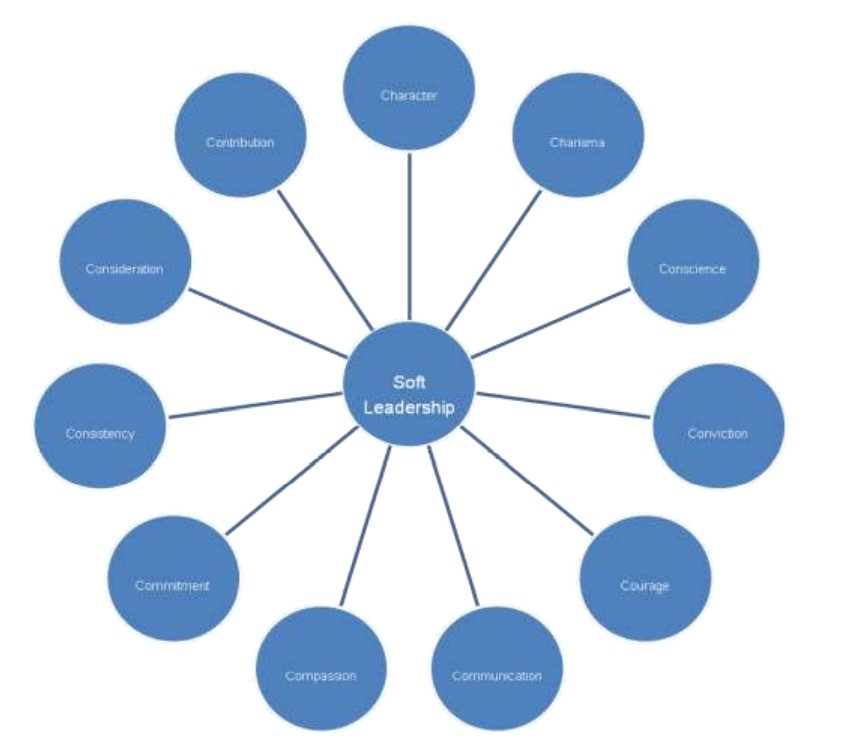How to Become a Transformative Leader in 2022
Published by Pavel Nakonechnyy on (updated: ) in Leadership and Soft Skills.To answer new challenges of nowadays interconnected, global, and technocratic world we need to embrace a new style of leadership. Professor M.S. Rao has developed a concept of Soft Leadership, based on behavioral theory and a collegial OB framework that can help us with that.
Soft Leadership is leading through soft skills and people skills. It emphasizes the significance of human resources focusing on the personality, attitude, and behavior of the people. Its tools are persuasion, negotiation, recognition, appreciation, motivation, and collaboration.
Soft Leadership is an assertive leadership where leaders adopt pleasing and polite communication to get the tasks executed. Soft Leadership focuses much on setting goals, influencing people and building strong motivated teams. To exercise Soft Skills you need the right mindset, skill set, and toolset.
Soft Leadership is based on the collegial organizational model. In it, there is not much gap between the superiors and the subordinates as are all considered partners for progress. This framework invites amazing responses from all stakeholders, thus enhancing organizational excellence and effectiveness. Some elements of that are met in Scrum model.
As per Blake-Mouton Grid, Soft Leadership falls more on “concern for people” and less on “concern for production.”
Soft Leadership – 11 Characteristics

To be a Soft Leader you must exercise 11 characteristics:
- Character. Through a strong character, leaders influence and guide their people. People have the tendency to look at the weaknesses rather than the strengths of others. Martin Luther King, Jr. said, “The ultimate measure of a man is not where he stands in moments of comfort and convenience, but where he stands at times of challenge and controversy.” Character is the key thing that differentiates good leaders from others.
- Charisma. People feel valued and pleased with charismatic leaders.It is the rarest of the rare qualities usually acquired through birth. There are various components of charisma such as warmth, smile, grace, body language, voice, and confidence. Max Weber defines charismatic authority as “resting on devotion to the exceptional sanctity, heroism or exemplary character of an individual person, and of the normative patterns or order revealed or ordained by him.”
- Conscience. Sophocles said, “There is no witness so terrible and no accuser so powerful as conscience which dwells within us.” People expect leaders to be ethical and responsible and look up to leaders whose conscience cares for them. Leaders have to convince their conscience first to convince others.
- Conviction. Convictions move leaders and their people forward toward achieving their goals. Great leaders of history like Mahatma Gandhi, Martin Luther King Jr., Dalai Lama, and Aung San Sui Kyi never compromised and stood like a rock despite stiff opposition and challenges and threats to their lives.
- Courage. According to Aristotle, courage is the first virtue, because it makes all of the other virtues possible. Mark Twain remarked, “Courage is resistance to fear, mastery of fear — not absence of fear.” Leaders’ courage commands confidence from their followers. People always want leaders with a backbone.
- Communication. It is through communication leaders express their ideas, ideals, and insights and persuade others to follow them. The leaders need to adopt an assertive communication style ideally and other styles from time to time to make the leadership effective. Leaders can influence others through communication alone, but no one can lead without communication.
- Compassion. Compassion means caring for others by ignoring your own interests. Real leaders encourage others, take care of others, empathize and demonstrate compassion for others. Only such leaders can influence and maximize the potential of their people and organizations.
- Commitment. Commitment makes leaders command respect among others. If you want your life to be successful, you have to be committed. Commitment is the bridge between the word and the deed.
- Consistency. Leaders need to demonstrate their consistency to have a profound impact on their people. People expect leaders to be predictable, responsible, and credible. Consistency is essential in investing our efforts to achieve significant results.
- Consideration. Consideration includes recognizing the good work done by others and appreciating them promptly, liberally, and graciously. It makes people win the confidence of others as it helps them connect with others quickly. Confucius rightly remarked, “Consideration for others is the basis of a good life, a good society.”
- Contribution. People respect the leaders who contribute their best to society without hankering for wealth, power, or prestige. Mother Teresa rightly said, “We feel that what we are doing is just a drop in the ocean. But the ocean would be less because of that missing drop.” John C. Maxwell says, “People who take advantage of others inevitably fail in business and relationships. If you desire to succeed, live by these four simple words: add value to others. That philosophy will take you far.”
The rapid changes in technology have made the world a global village as people with diversified backgrounds work under one roof. Adopting Soft Leadership allows for meeting people’s aspirations and addressing global leadership challenges. In the time of Great Resignation, you may know how to argue with people rationally, but it won’t be enough without empathy. People want their leaders to become their counselors and coaches to groom them for their all-around success. Hence, companies started to focus on the slogan of “employee first and a customer second.” A great leader must be centered on others.
To conclude in the words of Woodrow Wilson, “You are not here merely to make a living. You are here to enable the world to live more amply, with greater vision, with a finer spirit of hope and achievement. You are here to enrich the world, and you impoverish yourself if you forget the errand.”
Based on the Rao, M. S. (2017) “Soft Leadership: An Innovative Leadership Perspective,” The Journal of Values-Based Leadership: Vol. 10: Iss. 1, Article 9.